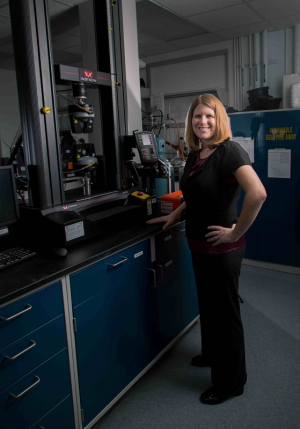A researcher with the University of Houston Cullen College of Engineering has won a $500,000 grant to develop plant-based plastics and rubbers.
Megan Robertson, assistant professor of chemical and biomolecular engineering, received the grant from the National Science Foundation’s CAREER Award program. CAREER Awards are designed to help faculty in the early stages of their research launch long-term, successful labs. They are widely considered one of the most prestigious grants given to young investigators.
With the funds, Robertson will use vegetable oils like soybean oil, palm kernel oil and linseed oil to develop new polymers. Polymers are long, chain-like molecules made up of repeating units. They are the key component of rubbers and plastics encountered in everyday life.
Today, most polymers are made from petroleum. This can present some issues, said Robertson, such as fluctuations in pricing and undesired environmental impacts related to processing the petroleum oils. Another issue, and one that is possibly most serious in the long term, is the limited nature of fossil fuels.
“People have been innovating with polymers that are primarily derived from petroleum over the last 100 years. We’ve learned a lot during that time, but in the end, petroleum is a finite resource. Are we going to run out of petroleum today? No, but we need to start thinking about this now, because it could take a long time to develop the same diversity in materials from plant-derived polymers that we currently have in petroleum-derived polymers,” said Robertson.
Plant-based polymers aren’t new, Robertson noted. In fact, in the 1940s, Henry Ford built a prototype car made with soybean-based plastics.
Since polymers from petroleum have gotten most of the attention for decades, however, there are many cases in which plant-derived polymers can’t match traditional plastics’ key mechanical properties, such as strength, flexibility and durability. That’s the project Robertson is taking on.
One of the challenges in developing good vegetable oil polymers is their chemical structure. Polymers that have desirable mechanical properties tend to contain individual molecules that are intertwined, similar to noodles in a bowl of spaghetti. This entanglement gives them many of their best characteristics, like high strength.
The polymers that Robertson is developing from vegetable oils, though, have long strands of carbon coming off the side of each repeat unit in the polymer chain. These strands limit how much the individual polymer chains intertwine with one another. As a result, these polymers from vegetable oils are typically weaker than their petroleum counterparts. Robertson, then, will explore ways to create vegetable oil polymers that are more fully entangled, and therefore have better mechanical properties. Ultimately, Robertson is aiming to create new materials that have properties that are even better than commercially available petroleum-derived materials.
In addition to synthesizing new polymers and optimizing their mechanical properties, this project will also look at their environmental impact. Vegetable oils include a type of chemical group (an ester) that makes them biodegradable. If the polymers Robertson develops retain this functionality, they should be biodegradable as well. The ability of these polymers to biodegrade will be tested in collaboration with Debora Rodrigues, an assistant professor in the college’s civil and environmental engineering department.
Robertson will also study the environmental impacts of these new polymers. While eliminating the use of petroleum in favor of plants seems good at first glance, the materials’ entire life cycles should be considered, she said. How much energy does it take to make these polymers? What chemicals are used to grow the crops? How much water is required? Does utilizing a plant-based source reduce the environmental emissions? To answer such questions, project collaborator Jay Turner, an engineering professor at Washington University in St. Louis, will work with Robertson to develop the full life cycle assessments of the polymers Robertson creates.
Their findings should help polymer researchers identify not only the polymers with the best mechanical properties, but those that make the most sense in terms of sustainability and environmental impact. This will help shape a science and an industry whose day is undoubtedly coming.
“Polymers and plastics are all around us,” Robertson said. “The problem we’re facing is related to efforts to find alternative energy sources, but we can’t use options like solar or wind to solve this issue. Alternative materials’ sources will require a new way of thinking about the problem, and we need to start working on this now.”
